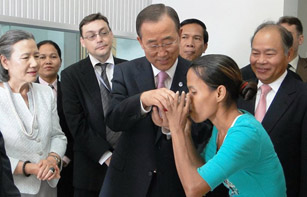
UN Secretary-General Ban Ki-moon hands a methadone dose to a patient at Cambodia's first methadone clinic in Phnom Penh, October 28, 2010
Nearly 10% of global HIV infections are due to unsafe injecting drug use. Sharing contaminated needles and injection equipment can readily transmit HIV. Of the estimated 15.9 million people who inject drugs, 3 million are infected with HIV.
In a recent visit to the first methadone clinic in Cambodia, United Nations Secretary General Ban Ki-moon praised government authorities and health workers for their efforts to reduce HIV infection and drug-related harm among injecting drug users. Launched in July 2010, the clinic has reached, to date, a total of 61 patients.
“This methadone maintenance therapy programme is providing an important service, not just to people struggling to conquer addiction, but to the broader community,” said Secretary-General Ban, after touring the clinic at the Khmer Soviet Friendship Hospital. “Evidence shows that such initiatives are more effective than incarceration in addressing the social problems caused by addiction.”
This methadone maintenance therapy programme is providing an important service, not just to people struggling to conquer addiction, but to the broader community
Secretary-General Ban Ki-moon
Opioid substitution therapy with methadone or buprenorphine is one a number of proven evidence-based measures that reduce HIV infection and drug-related harm, including access to sterile injecting equipment, HIV testing and counselling, antiretroviral therapy, condom promotion to drug users and their sexual partners and community-based outreach.
While countries are increasingly adopting such harm reduction measures, coverage remains poor. According to the UN Reference Group on HIV and injecting drug, only 8% of injecting drug users globally receive opioid substitution therapy and just 4% of HIV-positive injecting drug users receive antiretroviral therapy. Only two needle syringes per injecting drug user are distributed per month.
Experience has shown that law enforcement approaches alone do little to reduce drug use and drug-related crime. Laws criminalizing the possession of injecting equipment or substitution therapy are major barriers in the HIV response, as the fear of criminal measures and prosecution force many drug users underground and lose the opportunity to stabilize their lives.




